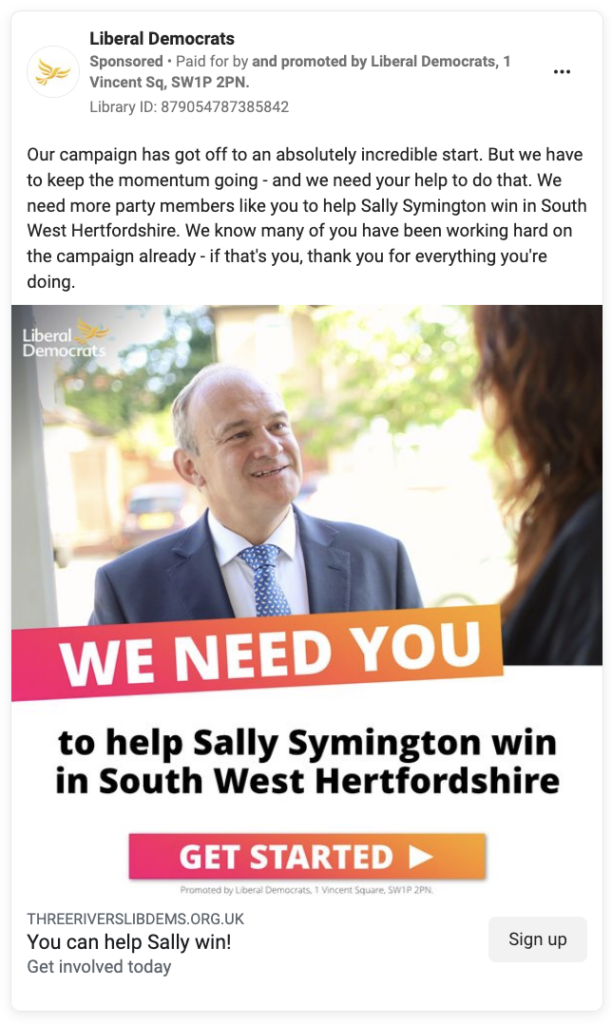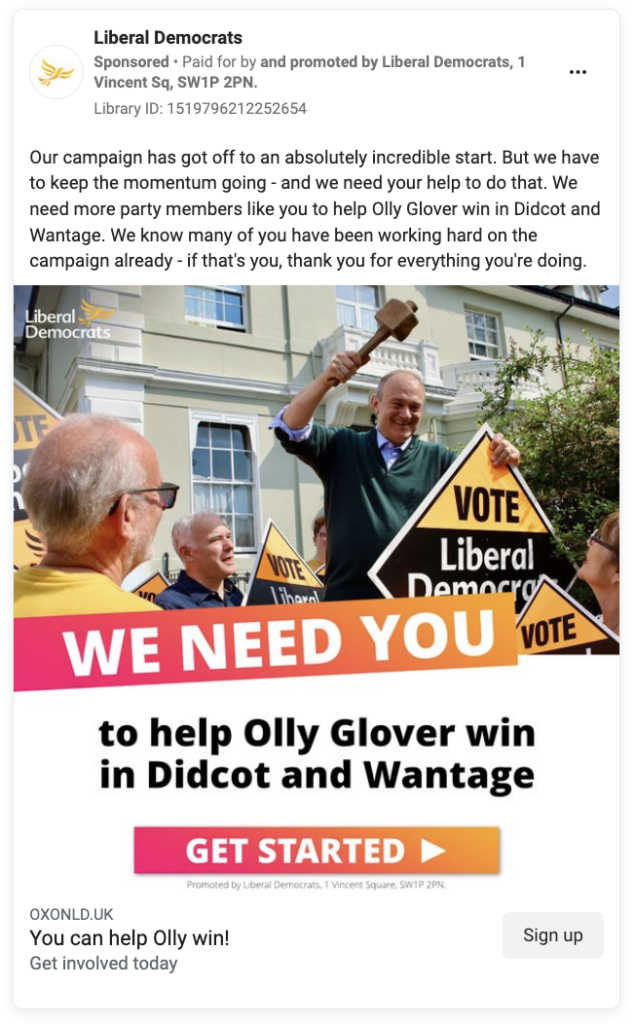In 2015, the Liberal Democrats were blindsided by their then-coalition partners the Conservatives running a ton of Facebook ads targeting seats they held in the west of England.
At the time, there was no ad transparency at all, so it was impossible to know with any reliability what was being said, to whom and how much was being spent to do it.
Fast forward to 2024, and the (still imperfect) ad transparency we have allows us to see something like the reverse happening – the new Liberal Democrat Facebook ad campaign that’s targeting, and trying to unseat, a whole host of Conservative candidates.
Let’s dig in.
The Lib Dems went live yesterday with around 180 Facebook ads, all of which were targeted at key constituencies where they’re targeting a Tory, or trying to hold onto a hard-won seat.
The ads themselves are pretty basic: static graphics with identical copy except for location and candidate name. Like this:

and this:

Here’s what we can learn from them:
1. The party is using its limited budget to galvanise activists
The first thing to note about the party’s ads are the calls to action (CTA). They’re focused on getting young, energetic party members involved in direct activism – delivering leaflets and knocking on doors. This is traditionally where the Lib Dems often outcompete parties with larger, but older memberships.
In a mirror image of the audiences targeted by the Conservatives, which we’ve discussed elsewhere, these ads focus most of their attention on 18-34 year olds with some distinctly ‘woke’ characteristics, including interests such as ‘ethical consumerism’, ‘social causes’ and ‘ecology’.
2. They’re going all-in on their ‘Blue Wall’ strategy.
Of 36 constituencies included in today’s campaign, 30 are currently actually or notionally held by the Conservatives. The other six are all held by the Lib Dems. Not even Labour seats like Sheffield Hallam, that could be vulnerable due to the party’s policy on Gaza, are being targeted.
While many members would like the Lib Dems to stake out a more progressive position, this strategy has been consistent under Ed Davey’s leadership. For instance, this week’s decision to oppose Labour’s plan to raise VAT on private schools will go down well in many of these leafy, well-to-do seats.
| Constituency | Notional incumbent | Party | Majority |
| Wimbledon | Stephen Hammond | Conservative | 628 |
| Carshalton and Wallington | Elliot Colburn | Conservative | 629 |
| Cheltenham | Alex Chalk | Conservative | 981 |
| Winchester | Flick Drummond | Conservative | 985 |
| Cheadle | Mary Robinson | Conservative | 2,336 |
| Lewes | Maria Caulfield | Conservative | 2,457 |
| Esher and Walton | John Cope | Conservative | 2,743 |
| South Cambridgeshire | Anthony Browne | Conservative | 2,904 |
| Guildford | Angela Richardson | Conservative | 3,337 |
| Eastbourne | Caroline Ansell | Conservative | 4,331 |
| Hazel Grove | Paul Athans | Conservative | 4,423 |
| Wokingham | Lucy Demery | Conservative | 7,383 |
| Godalming and Ash | Jeremy Hunt | Conservative | 8,817 |
| Woking | Jonathan Lord | Conservative | 9,767 |
| Tunbridge Wells | Neil Mahapatra | Conservative | 14,645 |
| Witney | Robert Courts | Conservative | 15,177 |
| Newbury | Laura Farris | Conservative | 16,047 |
| Yeovil | Marcus Fysh | Conservative | 16,181 |
| Chelmsford | Vicky Ford | Conservative | 17,621 |
| Mid Sussex | Mims Davies | Conservative | 18,197 |
| Chichester | Gillian Keegan | Conservative | 21,490 |
| Hinckley and Bosworth | Not yet known | Conservative | 26,278 |
3. It’s a confident target list.
Anyone watching the Lib Dem campaign so far will have noticed they’re intent on having a good time. Partly this is because it’s hard for smaller parties to cut through, but it also seems to be based on some real confidence about their prospects. When we look at the size of the Conservative majorities in some of the seats the party is targeting, this is borne out.
So while there are some classic Con/LD marginals in there – the likes of Wimbledon, Winchester, Cheltenham, Cheadle and Lewes – there are even more seats you wouldn’t usually think of as anything other than very safely Tory. Woking (2019 majority 9,767), for example, has been solidly blue since it was created in 1950, while David Cameron’s old seat of Witney saw the Conservatives win with 15,177 votes to spare last time around.
4. Boundary changes add uncertainty
There are a lot of new seats in this election. This is having an impact on the Lib Dem strategy – both offensively and defensively. Four of the six notionally Lib Dem seats mentioned in the ads were either won in by-elections since 2019, or are subject to boundary changes, or both.
On the other side of that equation, boundary changes can bring into play seats that would have appeared irrational choices last time around. One example is the seat of Hinckley and Bosworth. No liberal party has held the predecessor seat of Bosworth since before WW2, but since 2019 the Lib Dems have won and increased their majority on the local council. So despite the constituency’s position in the absolute middle of the Midlands, and a Tory majority of some 26,278, it’s on the party’s list.
Conclusion
Before 2018, when Facebook started to provide some ad transparency, you’d have needed to make educated guesses about the places parties were targeting their ads. The transparency that has emerged in recent years gives us more certainty, helps us ‚read‘ campaigns in real time, and avoid the types of surprise that occurred in the 2015 election.
Transparency can also reassure us that it’s less likely anything untoward is happening. What we can see here is straightforward, solid Liberal Democrat campaign methodology, where they try to find and motivate activists, and put them in the places where the party thinks it has a good chance of taking the seat.
Lastly, the Lib Dem ads show us the scale of the challenge the Tories face at this election, as they’re challenged from left, right and centre by Labour, Reform and the Liberal Democrats in hundreds of seats across different parts of the country. Finding a path to any sort of safety is going to be very difficult for them.
